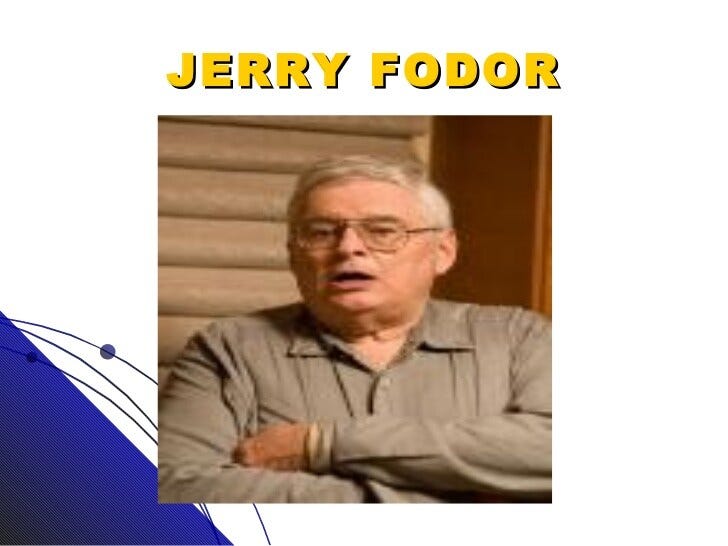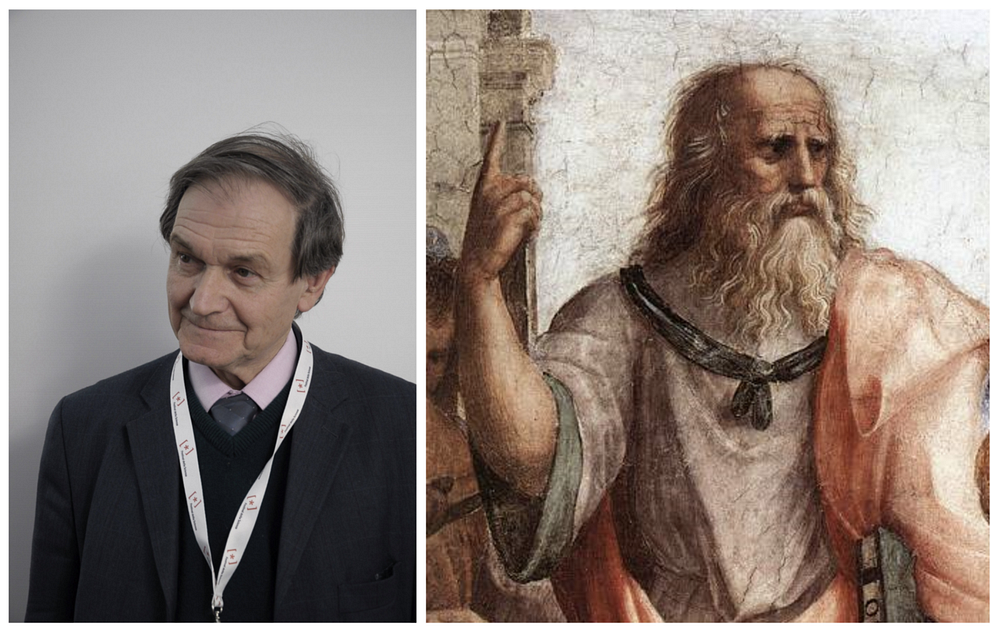“The original question, ‘Can machines think?’, I believe to be too meaningless to deserve discussion.” — Alan Turing
In (vague) accordance with the words of Alan Turing above, in this essay there will be no attempt to tackle the word “thought” (or “thinking”) or define (or explain) what, exactly, it means. That said, the semantics of the issues covered in the following will — inevitably — still be hovering in the background.
The Prehistory of Thought
Some philosophers have argued that something (whatever it was) relatively complex must have predated language use in humans otherwise language wouldn’t have arisen in the first place. In other words, language couldn’t have come from nowhere — ex nihilo. So it can be assume that at least some kinds of conscious activity or even thought must have predated language use. The question is: Which kinds of conscious activity or thought?
I suspect that some people would question the use of the word “thought” primarily for two reasons:
(1) Language (of various forms) is used in most examples of thought.
(2) Only a language-user would have risen to the level of thought in the first place.
Yet there are many acts of the mind (or mental events) which, arguably, don’t involve language — even in adult human beings. Mental imagery is just one example.
You can imagine a round blue shape, for example, being stuck on the surface of a black square. You can even imagine adding an extra nose to someone you know. Despite that, some philosophers may argue that such mental activity (even if non-linguistic) could only be carried out by language users. They may argue that language even “infects” such (supposedly) language-innocent examples as mental imagery. After all, without the mastery of language, you may not even have a concept of a square and of a round shape. (This will depend on how we take the word “concept”.) The same goes for adding a nose to a face. The mental imagery itself doesn’t include the use of language; though perhaps only a language-user could think about such mental images and juxtapose them in the ways he, she or it does.
In any case, it’s not clear if philosophers (at least not on their own) can answer questions as to what humans thought about (or how they thought) before they were language users. (Weren’t homo sapiens always language users in some very basic sense?)
The evolutionary fact (or simple possibility) that something must have predated language (i.e., earlier than, say, 100,000 years ago) was mentioned earlier. Yet we don’t need to go that far back. Philosophers have also argued that right here and right now - and before humans say anything or even think something to themselves — something must come before the articulation (even if a sub-vocalisation) of any natural-language expression or vocalisation...
Or must it?
Many (analytic) philosophers, for example, have talked about an abstract proposition coming before its expression in a natural language. That may be the case. However, that doesn’t impinge on what goes on in an individual’s mind and brain before he expresses himself in a natural language. Even if abstract propositions do exist, then there’s still a different question to be asked about what predates natural-language expressions in the mind-brains of human language users — i.e., regardless of a realm of abstract propositions (if such things “exist” — or have being — at all).
One answer to some of this is the “language of thought” (LOT) theory first advanced by Jerry Fodor. Others provide a more naturalistic (or neuroscientific) account of what happens before we say or think something in a natural language.
Take the position of Paul Churchland.
Paul Churchland and Jerry Fodor

The Canadian philosopher Paul Churchland (1942-) argued that
“how to formulate, manipulate, and store a rich fabric of propositional attitudes is itself something that is learned” .
And elsewhere in the same paper he wrote:
“[L]anguage use is something that is learned, by a brain already capable of vigorous cognitive activity…language use appears as an extremely peripheral activity, as a species-specific mode of social interaction which is mastered thanks to the versatility and power of a more basic mode of activity. Why accept, then, a theory of activity that models its elements on the elements of human language?”
It can be assumed that the first quote above would be given an immediate reply by a follower of Jerry Fodor (1935–2017). He may argue that the formulation, manipulation and storage of “a rich fabric of propositional attitudes” can be accounted for by something linguistic or at least something language-like: i.e., the language of thought. Thus we don’t escape from language here. Indeed, with relevance to the issue of animals, Fodor says that the cognitive activity of animals could also be “linguaformal”.

Although Churchland may accept that the LOT could account for our learning (i.e., in the first place) how to formulate, manipulate, and store a rich fabric of propositional attitudes, his own position is that our learning to do so is actually based on purely non-linguistic phenomena in the brain. To Churchland, it’s mainly a question of the following:
“[A] set or configuration on complex states…figurative ‘solids’ within a four- or five-dimensional phase space. The laws of the theory govern the interaction [“formulation”?], motion, and transformation [“manipulation”?] of these ‘solid’ states within that space.”
The point of bringing in Churchland here is — and we needn’t accept his whole philosophical scheme — that if he supplies us with some possibilities (or actualities) of non-linguistic “cognitive activity”, then clearly this can be co-opted to show the same for non-linguistic thought.
Yet Fodor muddied the water (as already stated) by claiming that, say, animal cognitive activity may also be “linguaformal”. The problem here is that Fodor’s use of the word lingua (in what inferentially appears to be his acceptance of an animal Language of Thought) may be a use of a word that’s so vague that it doesn’t satisfy any of the usual criteria for being a language.
Churchland offers us more on all this.
Take his reference to non-linguistic “representations” in the following:
“Any competent golfer has a detailed representation (perhaps in his cerebellum…) of a gold swing. It is a motor representation…The same golfer will also have a discursive representation of a gold swing (perhaps in his language cortex…).”
And later:
“A creature competent to make reliable colour discriminations has there developed a representation of the range of familiar colours, a representation that appears to consist in a specific configuration of weighted synaptic connections…This recognition depends upon the creature possessing a prior representation…This distributed representation is not remotely propositional or discursive…It…makes possible…discrimination, recognition, imagination…”
In a strong sense, what’s been argued in the passages above makes much sense — at least from an evolutionary perspective. At the level of species there must have been a continuum (at least of a kind) between animal and human thought. And, on the scale of individual human beings, there must also be a continuum between what can be called proto-thought and purely linguistic thought or verbal expression. (That’s if any mental activity at all can ever be purely linguistic.)
So, finally, what about the classic case of thinking about mathematics?
Roger Penrose’s Position on Mathematics

Do mathematical (for want of a better word) cognitions require words?
Would someone have ever reached any level of mathematical skill without being a user of language in the first place? Of course it must now be said that simply because language was (obviously) required to get a mathematician to where he/she is, that doesn’t also mean that language is used in all — or indeed any — of his/her mathematical (again, for want of a better word) reasonings.
More specifically, Roger Penrose (1931-) once stated the following words:
“[I] find words almost useless for mathematical thinking. Other kinds of thinking, perhaps such as philosophizing, seem to be much better suited to verbal expression. Perhaps this is why so many philosophers seem to be of the opinion that language is essential for intelligent or conscious thought!”
Like Plato before him, Penrose appears to glory in this escape from contingency. In this case, from the contingency of “words”. To be somewhat poetic/rhetorical again: both Plato and Penrose believe that the lack of precision when it comes to words (or all linguistic expressions) must be escaped from… Or at least that’s the case when it comes to mathematics.
Yet surely language is - (again) obviously - essential for Platonists too. That is, in order to become the Platonists that they are, language itself must have led their way when it comes to most — or even all — of their philosophical reasonings and then positions. Indeed (as just stated) that’s even the case when it comes to their mathematical cognitions.
So if we now take Penrose himself.
It can be argued that he would never have adopted and used these (supposedly) non-linguistic mathematical (as he puts it) “concepts” if they weren’t first described to him in “words”. And, as with the a priori in philosophy (or epistemology), we firstly need to learn what the a priori is in words — and also to learn the terms used in a priori statements — in order to have a priori “thoughts”. So this must mean that Penrose is talking about what happens after such words and linguistic concepts are acquired. And what happens after is (Penrose argues) something that’s completely non-verbal (or non-linguistic).
To sum up — what may be — Penrose’s position.
Of course one has to know — a posteriori — what the words and symbols in the equation, say, 2 + 2 = 4 mean. Yet after that, the non-linguistic status of this truth remains unchanged. Thus the Platonist will happily and obviously accept that we firstly need to learn the terms involved in mathematics and other areas of rationalist inquiry. However, once we’ve acquired such words and symbols, then we can (to quote Kant’s critical words on Plato’s position) “float free of the moorings” of language and rise into the Platonic realm.










No comments:
Post a Comment